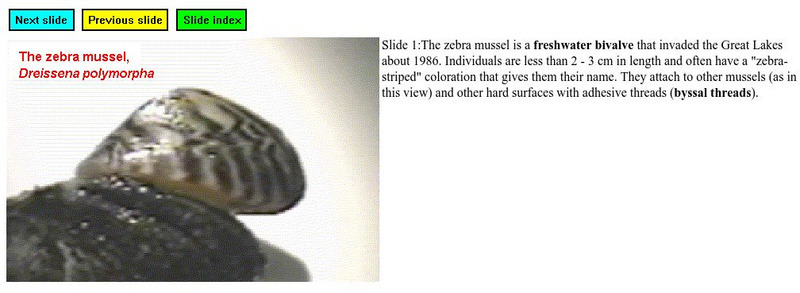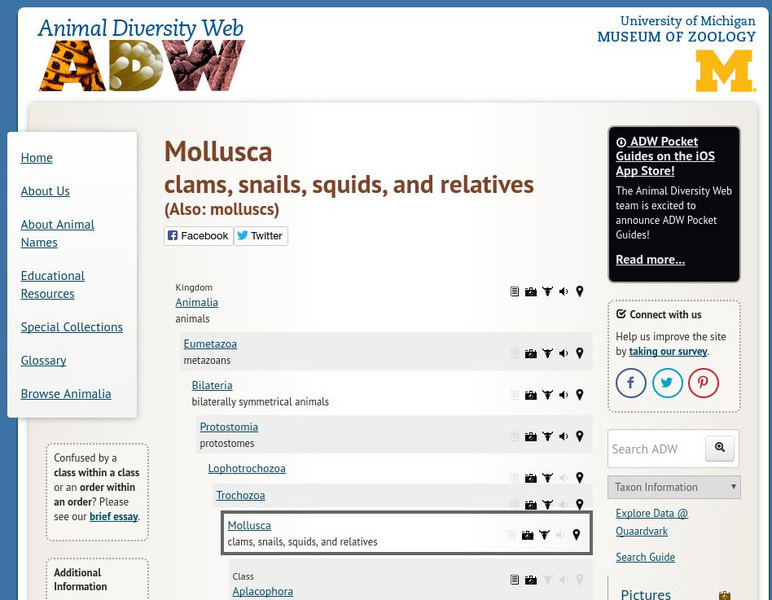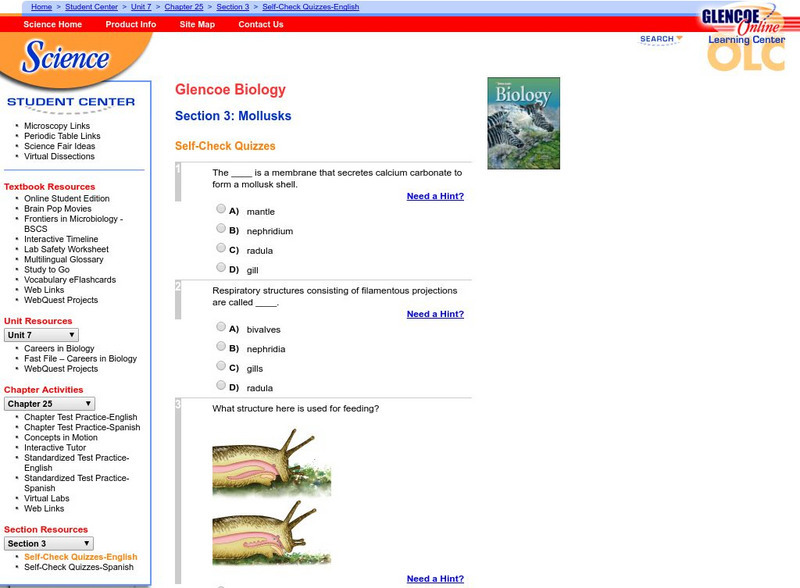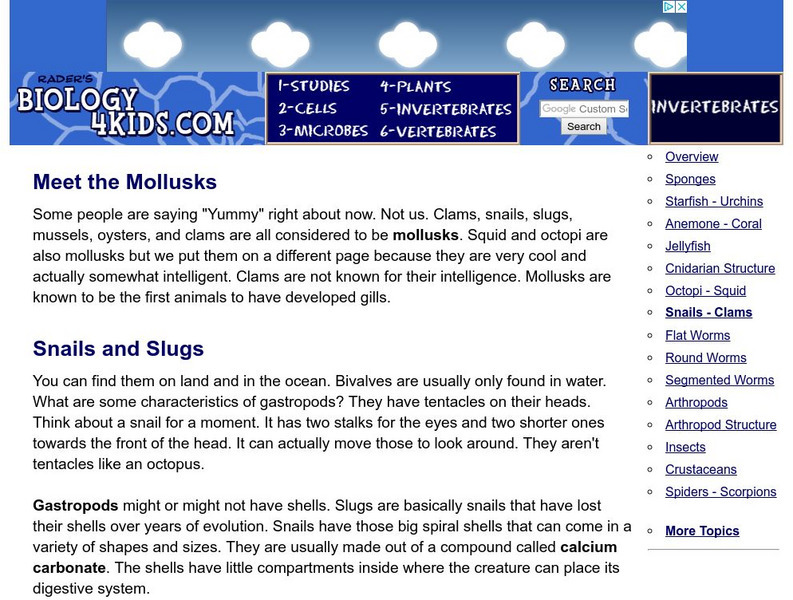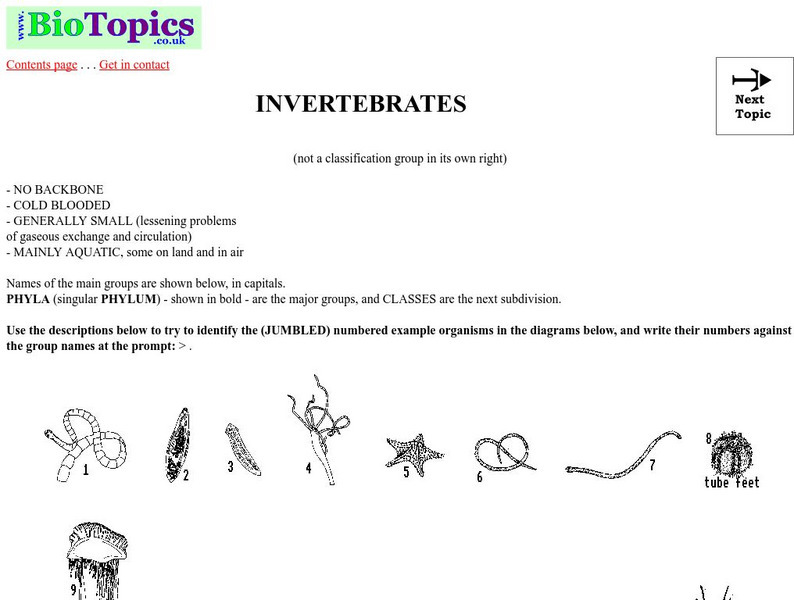Hi, what do you want to do?
Curated OER
Phylum mollusca
This is an organized presentation that lists characteristics and features of their general body features. Mollusc is spelt with both a 'c' and a 'k' in various stages of this Powerpoint so an explanation by the teacher of Scientific...
Curated OER
Classification of Living Things
In this biology learning exercise, students identify and locate various vocabulary terms relating to the classification of living things. There are 28 biology terms located in the word search.
Other
Zebra Mussel Page: Zebra Mussel Slide Show
Click through the whole slide show to find basic information on zebra mussels, how they live, the problems they can cause, and possible solutions.
Other
Life on Australian Seashores: Molluscs
Provides a very basic look at the anatomy of a mollusk including the proposed anatomy of what the mollusc ancestor probably looked like. Hyperlinks to individual animals in the mollusk group.
Other
Mollusca
A general description of mollusca and some discussion of those found in the waters of Great Britain.
US Fish and Wildlife Service
Discover Freshwater Mussels: America's Hidden Treasure
This resource explains the critical role that mussels play in the United States.
Regents of the University of Michigan
Animal Diversity Web: Phylum Mollusca (Mollusks)
A great, detailed description of mollusks. Discusses parts of their external and internal anatomy and their functions, and lists several characteristics of mollusks. Tabbed pages include pictures, specimens and classification.
Other
University of Wisconsin La Crosse: Zoo Lab: A Resource for Animal Biology
A fantastic source of basic zoological information, a great supplement for all animal biology classrooms.
University of California
Ucmp: Aristotle
The life and philosophical treatises of Aristotle (384-322 BCE) are surveyed, including his writings on biology, zoology and physics.
PBS
Pbs: What's Killing the Oysters?
A special report provided for by PBS on what's killing the oysters of Ago Bay in Japan.
Other
Octopus of California
Twenty great pictures of octopi from California. This site also offers up close pictures of invertebrates, squids, and tidepools.
Other
The Cephalopod Page: What Behavior Can We Expect of Octopuses?
The navigation and spatial skills, tool use, play, and personalities of octopuses are covered in the studies discussed in this article.
Other
Wonders of the Sea
Good general description of the phylum with subordinate descriptions in each of the classes.
McGraw Hill
Glencoe Biology: Mollusks: Self Check Quiz
Take this five question multiple-choice question quiz over the Phylum Mollusca.
University of Massachusetts
University of Mass.: Freshwater Mussel Reproduction
This site, which is provided for by the University of Massachusets, gives a very good example of a typical bivalve reproductive cycle.
Biology 4 kids
Biology4 Kids: Clams and Snails the Mollusks
A concise beginners research page highlighting the major characteristics of the Mollusks.
Wikimedia
Wikipedia: Squid
This encyclopedia article from Wikipedia provides a general overview of squid. Content includes a focus on their physical characteristics, diet, and habitat.
Other
Giant Pacific Octopus
In this interesting site, you will delve into information about the world's largest octopus. Learn about the defense mechanisms that octopuses use and weapons they use on their prey.
PBS
Pbs Teachers: Scientific American: Creatures of the Deep: Spineless, but Smart
Investigate scientists' explorations of octopus middens, or garbage piles, and apply this scientific observation to an examination of a school lost-and-found collection. Create an inventory and analyze the objects from various perspectives.
PBS
Newton's Apple: Black Pearls
A lab activity to illicit discussion/understanding of the way in which mollusks produce an economic product.
Australian Broadcasting Corporation
Australian Broadcasting Corporation: News in Science: Monsters of the Deep
This site from the Australian Broadcasting Corporation explains the uses and effects of an octopus's poison. The information that is presented is somewhat brief, but factual, and worth checking out on the subject.
Science Struck
Science Struck: Decomposers in the Ocean: Role and Examples
Describes five different types of decomposers that feed on decaying organic matter in the oceans and that are at the bottom of the ocean food chain.







